The Best School Accounting Software
We’ve reviewed the top school accounting software for educational institutions, from K-12 districts to universities, to help manage funds, tuition, and budgets.
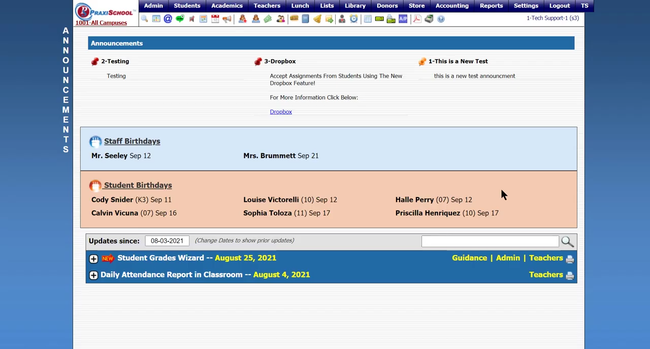
- Able to handle private schooling and daycare
- Centralized location for vocational programs
- Parent and student portals provide access to custom forms
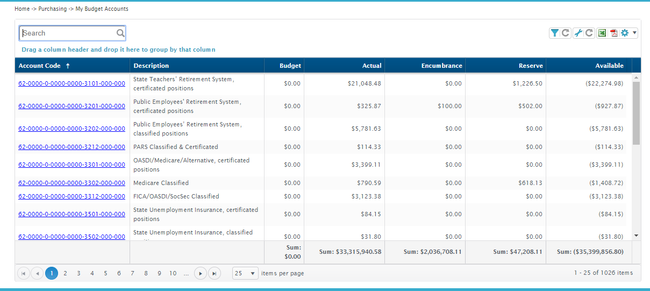
- Has customizable report templates
- Offers an employee self-service portal
- GAAP and USFR compliant
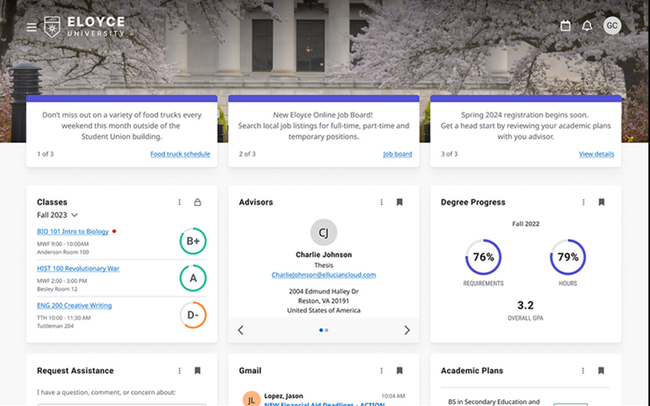
- Flexible deployment options
- Expertise in serving higher education facilities and organizations
- Scalable and extensible for growing systems
In this guide, we evaluate the top accounting software built for schools based on how well they support different institutions like colleges and private schools. We also based our picks on functionality like tuition management and grant tracking.
- PraxiSchool: Best Overall
- AptaFund: Best for K-12 Schools
- Ellucian Banner: Higher Education Accounting
- Blackbaud Financial Edge NXT: Best For Private Schools
- Multiview: Easy to Integrate
- FINACS: Best Tuition Management
- QuickBooks Online: General Accounting
- Sage Intacct: Best for Multiple Campuses
PraxiSchool - Best Overall
PraxiSchool offers a fully integrated accounting suite that manages attendance, grades, and the classroom, making it a strong all-in-one system. PraxiSchool manages tuition, allowing parents to pay their tuition with automated billing, allowing two payers for each account. Nonprofit schools and clubs can manage donors and create various donation campaigns.
Praxi includes school management capabilities so teachers can manage their grade books, create lesson plans, and assign seats directly in the system. Parents can utilize online portals to view and manage student information or review report cards.
Some teachers may encounter a small learning curve when getting comfortable with the system. However, we found that after PraxiSchool had been fully implemented, the overwhelming majority of users reported a positive experience on the platform.
AptaFund - Best for K-12 Schools
AptaFund is best for K-12 school districts and charter schools looking to improve their financial management. The system allows employees to customize their dashboards and see only important information about their day-to-day activities. It even has built-in state-specific reporting to automate redundant financial tasks needed for state compliance, making reporting easy for school districts.
AptaFund was designed to meet the needs of K-12 school districts by offering a system to manage accounting, human resources, and grants. Because the system is cloud-based and centralized, districts can easily manage their finances in one place, anywhere the internet is accessible.
School districts can track grant disbursement and capital projects to help districts plan and budget long-term finances. For school districts with student clubs and organizations, AptaFund can track club activity funds without getting new software for each organization.
Ellucian Banner - Higher Education Accounting
Ellucian Banner allows colleges and universities to manage their complex budgets using modules for general ledger, accounts payable/receivable, and fixed asset management. It offers grant accounting for institutions requiring tracking grant expenditures for research and academic purposes.
Ellucian Banner also includes a student financial aid module for colleges and universities. It enables these organizations to manage the entire financial aid process – from application to disbursement. Although the system has been created for both small colleges looking to scale and large universities, budget-conscious institutions with limited expenditure might find its pricing and long-term contracts cost-prohibitive.
Blackbaud Financial Edge NXT - Best For Private Schools
Blackbaud Financial Edge NXT’s fund accounting module is great for private schools needing to manage multiple sources. The system automatically records each grant, program, and donation, helping the administration access detailed financial data. Using this, you can create more accurate budgets for each restricted fund to ensure clear reporting and compliance with deadlines.
The fund accounting module also lets you create visual reports to view important KPIs for your school. Whether it’s budgets vs actuals, revenue, or total active grants, you can quickly view crucial data to stay on top of your finances. It even features an “insight designer” that lets you build your own data presentation if you want something different from a chart or graph.
The Financial Edge NXT system integrates seamlessly with Blackbaud’s other products, including Tuition Management and Student Information Management. This makes it a great all-in-one solution for creating budgets, tracking tuition, and managing students. It’s a huge benefit for private schools that are primarily funded through tuition and donations. While its additional modules are strong, we found its ability to integrate with third-party applications limited compared to other accounting software.
Multiview - Easy to Integrate
Multiview ERP is a top pick for school accounting software due to its integration options and ability to connect with various systems. Schools can integrate existing Student Information Systems such as GradeLink. This is crucial for schools that depend on other systems for student management and payroll. Multiview also offers a comprehensive financial management package that includes accounts payable and receivables, general ledger, and asset management.
We found Multiview’s highly customizable reporting a useful tool for tracking spending, generating reports for audits, and overall gaining insight into a school’s finances. Although these extensive financial management features are helpful for experienced finance professionals, users unfamiliar with accounting might encounter a learning curve when getting started.
FINACS - Best Tuition Management
FINACS by Administrator’s Plus is a school accounting software with integrated tuition management. It enables schools that rely on tuition as their primary income source to manage their cash flow effectively. We found private, charter, and parochial schools that benefit most from FINACS.
FINACS automates the sending of tuition invoices and allows the administration to set custom billing cycles to reduce the amount of manual work and errors that could occur. Each student has their own account, and FINACS keeps a detailed record of each student. We found this feature makes tracking tuition fees, payment history, or following up on unpaid balances easier for administrators.
QuickBooks Online - General Accounting
QuickBooks Online is a top pick for school accounting because it provides a straightforward and intuitive platform for managing private and public school accounting. Schools can prepare tax reports, manage vendors, and track income and expenses to stay on top of their bookkeeping.
As QuickBooks Online is not made specifically just for schools, employees with experience in other industries can quickly get started on its platform. It requires integration with outside systems, such as SchoolCues, to have school-specific features such as tracking students and grades.
Although QuickBooks can be quickly learned and understood, some accounting professionals hesitate to use QuickBooks because it allows employees to delete and edit transactions at any time. This can lead to incomplete audit trails or missing information if employees are not appropriately trained.
Need a school management software to integrate with QuickBooks? Explore our roundup for school management software
Sage Intacct - Best for Multiple Campuses
Sage Intacct is an accounting and financial management software for schools with complex accounting or multiple campuses. Local school administrators can manage their specific budgets, expenses, and revenues independently from other campuses.
While each campus can manage its own finances, Sage Intacct provides a centralized hub to generate reports for individual campuses or combine reports across all locations for a holistic view. Schools can implement role-based access control, limiting access based on users’ specific financial roles and responsibilities.
Because Sage Intacct is a premium accounting software, smaller schools or schools with tight budgets might find the cost of implementation and licensing higher than other options.
What is School Accounting Software?
School accounting software helps manage financial and administrative tasks unique to educational institutions. Some schools may use general accounting software. However, administrators may opt for specialized systems that help manage school fund accounting, student fee collections, student records, class registration, classroom supply inventories, or parent-teacher communications.
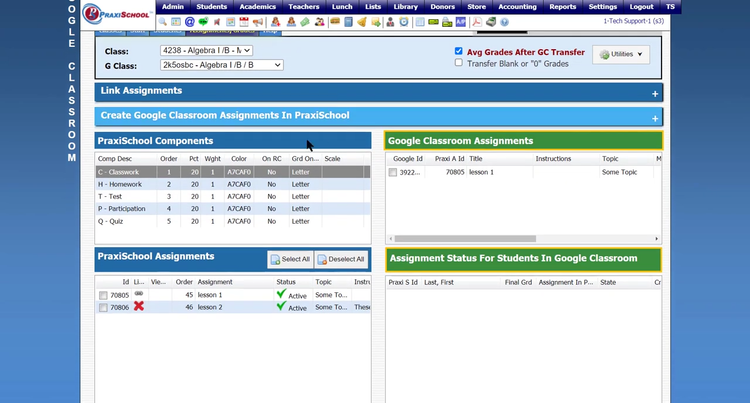
Key Features
Schools and other educational organizations operate with a mission different from that of a commercial company. Not surprisingly, their accounting needs differ in many ways. That being said, educational organizations and commercial companies share key accounting practices: cash management, analytical report tracking, creating budgets, and identifying and tracking operational costs. Software developed specifically for usage in schools, school districts, and training companies is designed to meet these needs.
Software Designed Specifically for Educational Organizations
Solutions designed generally for commercial use often aren’t adequate for meeting the full needs of educational organizations. Many educational organizations operate on a non-profit basis. Consequently, support for fund accounting practices is an important part of accounting software designed for the educational organization. Additionally, educational organizations typically need to database a considerable amount of information about students and tie it back to accounting records.
Integration Between Accounting and Student Records
Whether your educational organization is a professional training company, a university, a private school, or a school district, utilizing software specifically designed to support educational operations can be beneficial.
One of the key elements of software specifically designed for educational groups is the integration between financial data and student records. Integrated information allows educational entities to lower the total cost of ownership by creating efficiencies associated with keeping all relevant information within one centralized database. Hardware requirements are significantly reduced when records are not duplicated across multiple systems. There is a major time savings impact, as well, when staff can access information easily from within one single system.
Fund Accounting Capabilities
Many educational organizations use fund accounting practices to track the allocation of funds for specific purposes. Funds are essentially accounting entities with self-balancing accounts designed to record cash, other assets, and related balances and liabilities. A fund accounting approach allows educational entities to track all expenditures to specific fund sources.
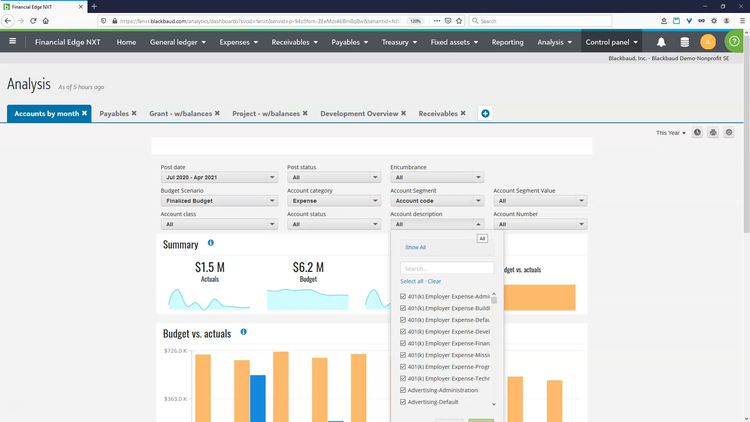
Primary Benefits
- Lower Operation Costs: By having your school’s financial data centralized in one system, schools can streamline their operations and reduce their labor costs. Schools with limited resources can benefit the most by managing the same amount of work with fewer employees
- Enhanced Compliance and Audit Readiness: Additionally, a unified school accounting system ensures that your educational institution adheres to financial regulations and standards. Many solutions simplify the audit process with audit-ready reports and financial records.
- Improved Transparency: Accounting software provides better insight into a school’s financial activities, streamlining decisions and communication with stakeholders. This is especially important for non-profit institutions that must build trust with donors to continue receiving donations.
- Increased Accessibility: Schools transitioning from manual accounting into a digital system can benefit the most from increased accessibility. A digital system makes data entry, sharing documents, and collaborating on financial decisions more efficient than existing manual methods.
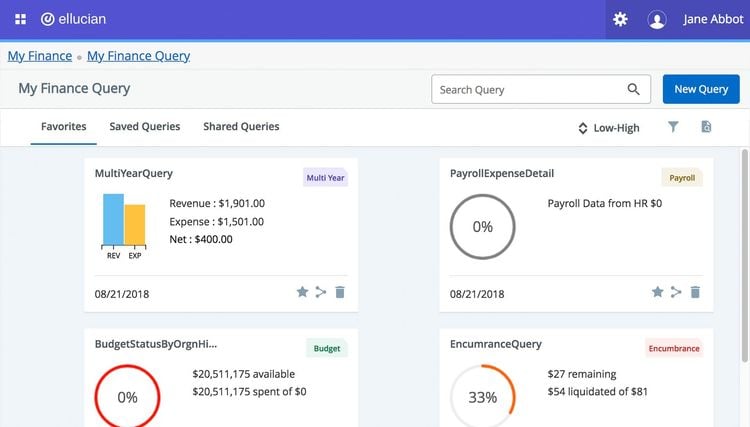
Taking the Next Steps
All schools, public and private, need to manage their finances. However, finding the right program for your organization can be a difficult and time-consuming adventure. Whether you are looking for a complete accounting and student management system or specific functionality to augment existing software, through a brief phone call, our software specialists will look to better understand your business and software needs to help you locate the most relevant solutions for your requirements. Get started today!















































